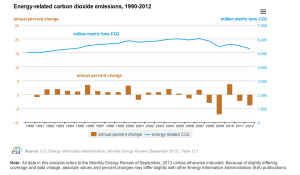The annual climate negotiations are going on at the moment in Warsaw, Poland. For long-time observers of the process, they have a Groundhog Day-esque quality to them. Every year the same issues seem to come up again and again, and it’s unclear if there has been any meaningful progress or if each negotiation is more or less a replay of what transpired the previous year, with divisions between developed and developing countries almost always ever-present.
Rich countries aren’t doing enough while poor countries and environmental activists are demanding greater action because there is a climate crisis. Somehow, 10,000+ activists descending upon delegates of nearly 200 nations doesn’t seem to do much, yet the annual dance. This year is no different, though it is an interim meeting before a new and improved climate agreement with some legal form set to be negotiated in 2015. In the meantime, here is what’s going down this year…
- U.S. carbon dioxide emissions fall to 18 year low, declining by 3.8% in 2012, as a result of fuel switching, conservation, lower economic activity, and renewables growth
- But global emissions are set to reach historic highs, 36 billions tonnes expected this year according to the Tyndall Center at the University of East Anglia (my alma mater) as it launches a new Global Climate Atlas. The rate of increase is slower than previous years but an increase all the same
The 2.1 per cent rise projected for 2013 means global emissions from burning fossil fuel are 61 per cent above 1990 levels, the baseline year for the Kyoto Protocol.

- The Global Carbon Budget project estimated that coal is the main culprit driving CO2 emissions:
In 2012, coal burning was responsible for 43% of the total emissions, oil 33%, gas 18%, cement 5.3%, and gas flaring 0.6%.
- The Japanese government scaled back its commitments on climate change in light of its nuclear power sector having gone dark post-Fukushima:
Under its new goal, Japan, one of the world’s top polluters, would still seek to reduce its current emissions. But it would release 3 percent more greenhouse gases in 2020 than it did in 1990, rather than the 6 percent cut it originally promised or the 25 percent reduction it promised two years before the 2011 nuclear disaster.
- The new conservative government in Australia is determined to undo the country’s carbon tax:
“We have said what we mean, and will do what we say. The carbon tax goes,” Abbott told the House of Representatives. “Repealing the carbon tax should be the first economic reform of this parliament.”
- The Clean Development Mechanism is in big trouble with its future status up in the air:
Investment in UN Clean Development Mechanism projects registered this year slumped to $15 billion in the 10 months through October from $198 billion in all of 2012, the first drop since 2005 when the UN started publishing the estimates.
- The ODI Institute publishes an infographic of 10 things you should know about climate finance and none of it is good:
Pledges to climate funds in 2013 are 71% lower than they were in 2012 (so far)

- UN talks at Warsaw display classic divide between developed and developing countries, this time over demands by poor countries for compensation for “loss and damages” (another take here):
The United Nations climate talks here are bogging down over the old divide between rich and poor nations on the question of who should pay when climate-related disaster strikes, with developing nations staging a symbolic walkout early Wednesday in protest at what they consider inadequate financial support from wealthy countries.
I will find some good news to report soon but this post ain’t it.
Joshua Busby is a Professor in the LBJ School of Public Affairs at the University of Texas-Austin. From 2021-2023, he served as a Senior Advisor for Climate at the U.S. Department of Defense. His most recent book is States and Nature: The Effects of Climate Change on Security (Cambridge, 2023). He is also the author of Moral Movements and Foreign Policy (Cambridge, 2010) and the co-author, with Ethan Kapstein, of AIDS Drugs for All: Social Movements and Market Transformations (Cambridge, 2013). His main research interests include transnational advocacy and social movements, international security and climate change, global public health and HIV/ AIDS, energy and environmental policy, and U.S. foreign policy.



0 Comments